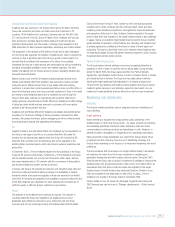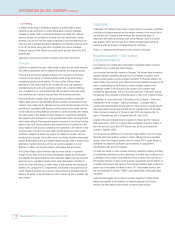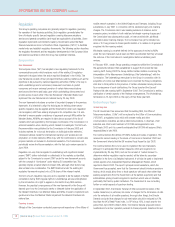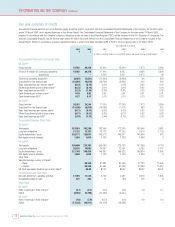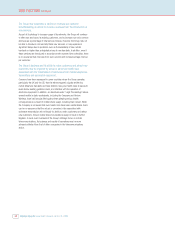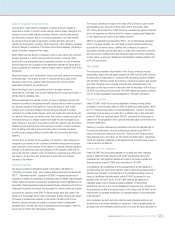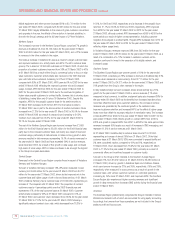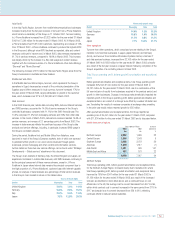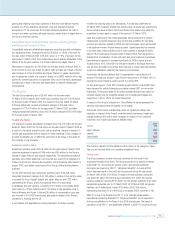Vodafone 2003 Annual Report Download - page 27
Download and view the complete annual report
Please find page 27 of the 2003 Vodafone annual report below. You can navigate through the pages in the report by either clicking on the pages listed below, or by using the keyword search tool below to find specific information within the annual report.
Vodafone Group Plc Annual Report & Accounts and Form 20-F 2003 25
RISK FACTORS
Regulatory decisions and changes in the regulatory environment could
adversely affect the Group’s business.
Because the Group has ventures in a large number of geographic areas, it must
comply with an extensive range of requirements that regulate and supervise the
licensing, construction and operation of its telecommunications networks and
services. In particular, there are agencies which regulate and supervise the
allocation of frequency spectrum and which monitor and enforce regulation and
competition laws which apply to the mobile telecommunications industry.
Decisions by regulators regarding the granting, amendment or renewal of
licences, to the Group or to third parties, could adversely affect the Group’s
future operations in these geographic areas. The Group cannot provide any
assurances that governments in the countries in which it operates will not issue
telecommunications licences to new operators whose services will compete with
it. In addition, other changes in the regulatory environment concerning the use of
mobile phones may lead to a reduction in the usage of mobile phones or
otherwise adversely affect the Group. Additionally, decisions by regulators could
further adversely affect the pricing for services the Group offers. Further details
on the regulatory framework in certain regions in which the Group operates can
be found in “Business Overview – Regulation”above.
Increased competition may reduce market share or revenues.
The Group faces intensifying competition. Competition could lead to a decrease
in the rate at which the Group adds new customers and to a decrease in the size
of the Group’s market share as customers choose to receive mobile services
from other providers.
The focus of competition in many of the Company’s markets continues to shift
from customer acquisition to customer retention as the market for mobile
telecommunications has become increasingly penetrated. Customer deactivations
are measured by the Group’s churn rate. There can be no assurance that the
Group will not experience increases in churn rates, particularly as competition
intensifies. An increase in churn rates could adversely affect profitability because
the Group would experience lower revenues and additional selling costs to
replace customers, although such costs would have a future revenue stream to
mitigate the impact.
Increased competition has also led to declines in the prices the Group charges
for its mobile services and is expected to lead to further price declines in the
future. Competition could also lead to an increase in the level at which the Group
must provide subsidies for handsets. Additionally, the Group could face increased
competition should there be an award of additional 3G licences in jurisdictions in
which a member of the Group already has a 3G licence.
Delays in the development of handsets and network compatibility and
components may hinder the deployment of new technologies.
The Group’s operations depend in part upon the successful deployment of
continuously evolving mobile telecommunications technologies. The Group uses
technologies from a number of vendors and makes significant capital
expenditures in connection with the deployment of such technologies. There can
be no assurance that common standards and specifications will be achieved,
that there will be inter-operability across Group and other networks, that
technologies will be developed according to anticipated schedules, that they will
perform according to expectations or that they will achieve commercial
acceptance. Commercially viable 3G handsets may not be available in the
timeframe required, which may delay commercial launch of 3G services. The
introduction of software and other network components may also be delayed.
The failure of vendor performance or technology performance to meet the
Group’s expectations or the failure of a technology to achieve commercial
acceptance could result in additional capital expenditures by the Group or a
reduction in profitability.
The Group’s business could be adversely affected by the non-supply of
equipment and support services by a major supplier.
Companies within the Group source their mobile network infrastructure and
related support services from a limited number of third party suppliers. The
departure from the market of one or more of these third party suppliers could
adversely affect the Group’s operations and may result in additional capital
expenditures by the Group.
The Company’s strategic objectives may be impeded by the fact that it
does not have a controlling interest in some of its ventures.
Some of the Group’s interests in mobile licences are held through entities in
which it is a significant but not controlling owner. Under the governing
documents for some of these partnerships and corporations, certain key matters
such as the approval of business plans and decisions as to the timing and
amount of cash distributions require the consent of the partners. In others, these
matters may be approved without the Company’s consent. The Company may
enter into similar arrangements as it participates in ventures formed to pursue
additional opportunities. Although the Group has not been materially constrained
by the nature of its mobile ownership interests, no assurance can be given that
its partners will not exercise their power of veto or their controlling influence in
any of the Group’s ventures in a way that will hinder the Group’s corporate
objectives and reduce any anticipated cost savings or revenue enhancement
resulting from these ventures.
Expected benefits from investment in networks, licences and new
technology may not be realised.
The Group has made substantial investments in the acquisition of 3G licences
and in its mobile networks, including the rollout of 3G networks. The Group
expects to continue to make significant investments in its mobile networks due to
increased usage and the need to offer new services and greater functionality
afforded by 3G technology. Accordingly, the rate of the Group’s capital
expenditures in future years could remain high or exceed that which it has
experienced to date.
Please see “Business Overview – Third generation licences and network
infrastructure”for more information on expenditures in connection with the
acquisition of 3G licences and expected expenditure in connection with the
rollout of 3G services. There can be no assurance that the commercial launch of
3G services will proceed according to anticipated schedules or that the level of
demand for 3G services will justify the cost of setting up and providing
3G services. Failure or a delay in the completion of networks and the launch of
new services, or increases in the associated costs, could have a material adverse
effect on the Group’s operations.


